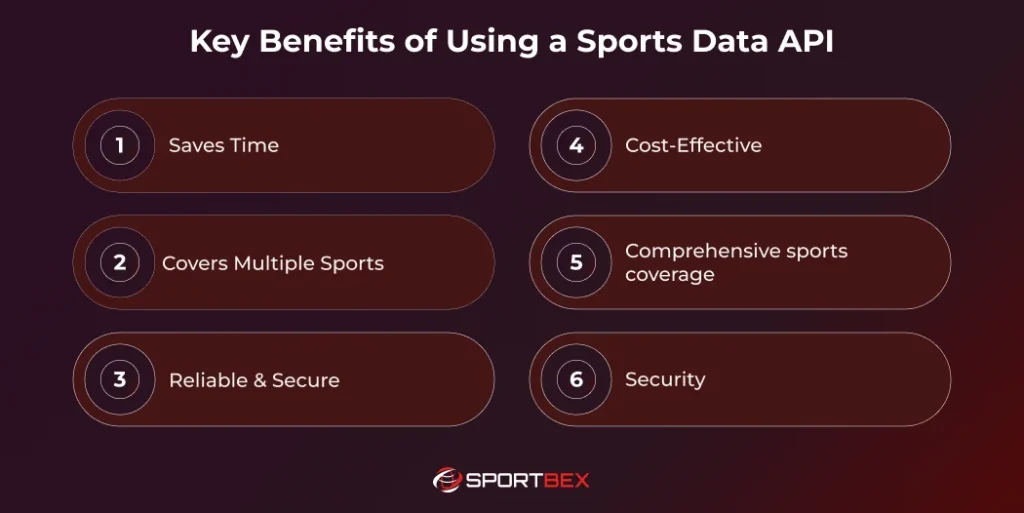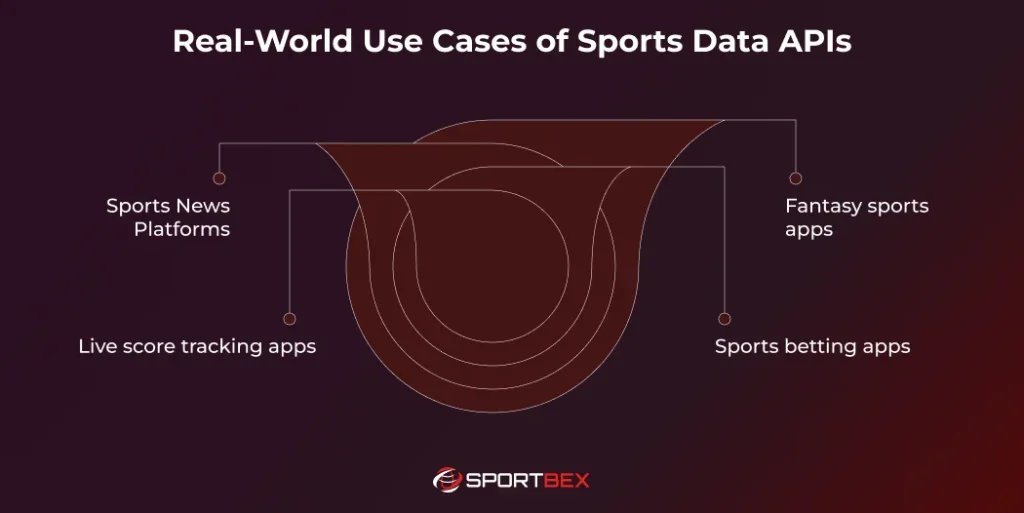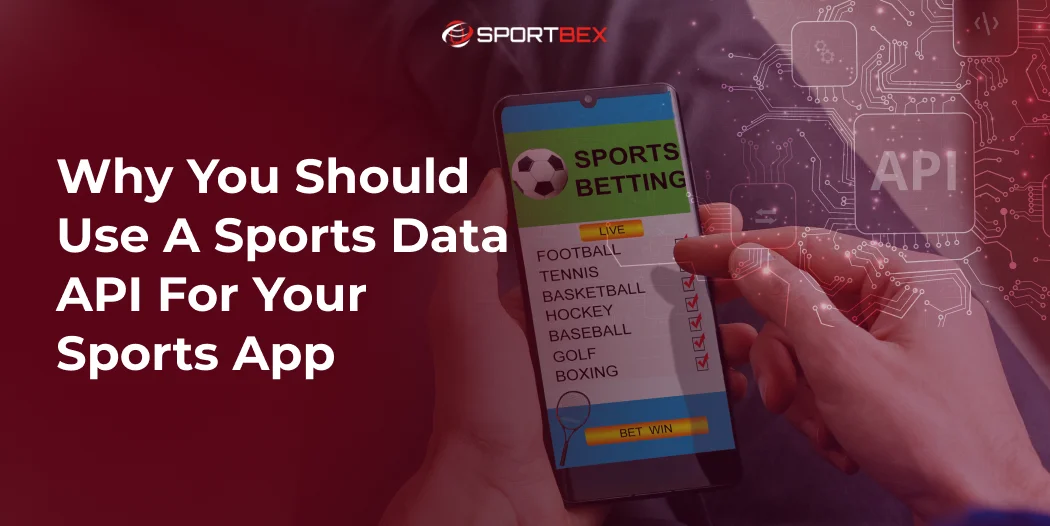Sports apps have become an integral part of the modern sports experience, providing fans with instant access to live scores, player statistics, betting odds, and real-time updates. However, delivering this level of accuracy and engagement can be challenging without the right technology. That’s where a Sports Data API makes all the difference.
A Sports Data API provides real-time access to sports information, including match scores, player statistics, team standings, schedules, and performance data. By integrating this API into your sports app, you can deliver up-to-date insights and interactive features that keep users engaged throughout the game.
Whether you’re building a fantasy sports platform, live score application, betting website, or sports news portal, you might wonder why you should use a Sports Data API for your sports app. The answer is simple: it ensures precision, speed, and reliability. With customizable data feeds and minute-by-minute updates, your platform can deliver the seamless and engaging experience today’s sports fans expect.
In this guide, we’ll explore what a Sports Data API is, why it’s a must-have for modern sports apps, the key benefits it brings, real-world use cases, and how to choose the best Sports Data API for your platform.
What Is a Sports Data API?
A Sports Data API (Application Programming Interface) acts as a bridge between your sports app and external sports databases, allowing seamless communication and data exchange. It provides instant access to valuable information such as:
- Live scores and results
- Team and player statistics
- Match schedules and fixtures
- Historical performance data
- Betting odds and analytics
In simple terms, it’s a powerful sports stats API solution that saves you from the complexity of collecting, updating, and managing vast amounts of sports data on your own.
With a real-time Sports Data API integrated into your app, your sports data integration allows you to focus on enhancing the user experience while ensuring accurate, reliable, and up-to-the-minute data delivery.
Why Your Sports App Needs a Sports Data API
In today’s fast-paced digital world, a successful sports app must deliver seamless, data-driven experiences, which is why a Sports App Needs a Sports Data API to meet the expectations of modern fans. A live Sports Data API empowers your app with real-time access to scores, player statistics, match results, and in-depth analytics, all without the need to manually manage complex datasets.
Without timely updates on games, players, and league standings, your app risks falling behind. Users expect instant, accurate, and user-friendly information delivered through reliable sports data feeds, and any delay can quickly lead to frustration or loss of trust.
Sports fans are passionate and highly engaged. If your platform does not provide live, reliable data, they will turn to competitors that do. Integrating API sports data ensures your app stays relevant, credible, and capable of delivering the real-time insights today’s audiences expect.
Key Benefits of Using a Sports Data API

Sports Data APIs come with several benefits that make them a vital tool for app developers. Here’s what they bring to the table:
Saves Time
Creating features such as live score tracking, player statistics, and league standings from scratch can be time-consuming and resource-intensive. Gathering reliable data, maintaining accuracy, and delivering real-time updates adds complexity and cost to development.
By integrating a Sports Data API, you can save valuable time and effort. The API provides ready-to-use solutions with a live score app, comprehensive player stats, and up-to-date league information, allowing your development team to focus on building a better user experience rather than managing data.
Covers Multiple Sports
A single Sports Data API can deliver data across a wide variety of sports, leagues, and tournaments, making it easier to manage and access information. For instance, a fantasy sports API can provide coverage for major events like the NBA, NFL, and Premier League, as well as smaller or niche competitions such as regional soccer leagues or emerging sports.
This comprehensive coverage allows you to focus on building engaging user experiences, rather than spending time sourcing and integrating data from multiple providers, by leveraging a reliable Sports Data API for your sports app.
Reliable and Secure
Sports Data APIs from trusted providers focus on reliability and security, ensuring developers can integrate them confidently into their apps. These APIs deliver accurate and consistent data using proven methods, maintaining smooth performance even during high-traffic periods such as major tournaments or live events.
This ensures your users always receive dependable information without interruptions.
Cost-Effective
Building your own sports data collection system can be expensive and time-consuming, requiring substantial resources and technical expertise. Using a reliable Sports Data API offers a cost-effective and efficient alternative.
These APIs provide ready-to-use data feeds, eliminating the need to develop complex systems from scratch. Many operate on flexible subscription models, allowing businesses to choose plans that fit their scale, budget, and specific data requirements, making it an affordable solution for any sports app.
Comprehensive Sports Coverage
A Sports Data API offers extensive coverage across multiple sports, leagues, tournaments, and competitions. Whether it’s major events like the NBA, NFL, Premier League, or niche leagues and emerging sports, the API ensures your app has access to a wide variety of data.
This comprehensive coverage allows platforms to provide users with complete and up-to-date information, from live scores and player stats to match schedules and historical performance data. By leveraging a single API or the best odds APIs, your app can deliver a richer, more engaging experience without managing multiple data sources.
Security
Security is a critical aspect when integrating a Sports Data API into your app. Reputable API providers ensure that all data transfers are encrypted and protected against unauthorized access. This guarantees that sensitive information, such as user data or subscription details, remains safe and confidential.
By relying on secure APIs, developers can maintain the integrity of their apps, prevent data breaches, and provide users with a trustworthy platform that delivers accurate, real-time sports information without compromising safety.
Real-World Use Cases of Sports Data APIs

If you’re curious about where Sports Data APIs are already in action, here are a few real-world examples:
Fantasy Sports Apps
Fantasy sports apps use Sports Data APIs to deliver real-time updates on player performance, ensuring users always have the most accurate and current information.
These APIs gather data from multiple sources to provide detailed player statistics, injury reports, and upcoming game schedules. By offering real-time insights through a Sports Data API for your sports app, they make the fantasy sports experience more engaging, competitive, and interactive, keeping users invested and informed throughout the season.
Sports News Platforms
Sports news platforms depend on Sports Data APIs to deliver timely and accurate content, from match previews to detailed player statistics. These APIs provide real-time updates on scores, game results, and player performance, ensuring that fans receive the latest information instantly.
By integrating Sports Data APIs from a reliable sports stats provider, news platforms can maintain accuracy, stay up-to-date with ongoing events, and offer a seamless experience for sports enthusiasts.
Sports Betting Apps
Sports betting apps rely on fast and accurate data to deliver a seamless experience for users. Sports Data APIs are essential in this process, providing real-time betting odds from multiple bookmakers and aggregating them to ensure users have the most up-to-date information.
This allows bettors to make informed decisions, while a Sports Betting API ensures trust, reliability, and accurate, real-time information across the platform.
Live Score Tracking Apps
Live score tracking apps, such as ESPN or SofaScore, depend on advanced technology to provide fans with real-time game updates. At the core of these platforms is a real-time Sports Data API, which ensures accurate and instant delivery of scores and match information.
These APIs, provided by a trusted live sports data provider, gather live information from various sports events. With a live sports stats API, your app delivers player statistics and game progress in real-time, ensuring users never miss a single moment of the action.
How to Choose the Right Sports Data API for Your App
Selecting the right Sports Data API is critical to the success of your sports app. Here are key factors to consider:
1. Data Coverage and Accuracy
Ensure the API covers the sports, leagues, and events relevant to your app. It should provide accurate, real-time data from a trusted sports data API provider so users receive up-to-date information, including live scores, player statistics, and match schedules, without delays or errors.
2. API Performance
Look for an API with high reliability and uptime. Consistent performance ensures your app runs smoothly, preventing disruptions caused by downtime or data delays, and maintains a seamless experience for users.
3. Customization Options
The best APIs offer flexibility to customize features, functionality, and data delivery. This allows developers to tailor the API to match the unique requirements of their app, creating a more engaging and user-focused experience.
4. Customer Support and Documentation
Reliable support and clear documentation are essential for smooth integration and scaling. Comprehensive resources and responsive assistance help developers troubleshoot issues quickly and implement solutions efficiently.
Choosing an API that meets these criteria ensures your sports app delivers accurate, reliable, and engaging experiences for users while simplifying development and maintenance.
Get a Ready-Made Platform On Rent.
Get Started TodayConclusion
A Sports Data API is more than just a feature; it is the backbone that keeps your sports app competitive in today’s crowded market. Whether you are developing a fantasy sports platform, live score tracker, or sports betting app, integrating a reliable API for sports provides the speed, accuracy, and functionality your users expect.
These APIs deliver real-time, accurate data, covering everything from player statistics and team rankings to live scores and match schedules. By integrating a robust Sports Data API into your live score app, your platform becomes a trusted resource for fans, giving them instant access to the information they want.
With a comprehensive live score API, you can enhance the user experience, engage more active users, and ensure your app remains the go-to destination for sports enthusiasts.
Frequently Asked Questions
The best API for your app depends on your specific needs. Look for options that offer comprehensive sports coverage, excellent documentation, and consistent updates. Test trial versions where possible to find the perfect fit.
Absolutely! Sports APIs are scalable, making them suitable for apps of all sizes. Many providers also offer affordable packages for smaller projects or startups.
Pricing depends on the provider, data coverage, and usage scale. Costs can range from affordable monthly fees to premium enterprise solutions.
Sports Data APIs connect to live systems and use advanced servers to pull and push updates instantly to your app. This ensures your users always receive up-to-the-minute information.
Yes, APIs allow customization to pull relevant data while excluding unnecessary details.
Recent Blog
Why Use a Soccer Betting API for Sportsbook Development
March 3, 2026
How Accurate Are Live Odds on Horse Racing Online Bookmakers?
March 2, 2026




